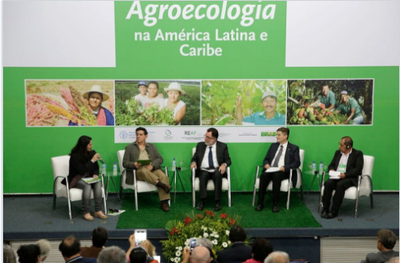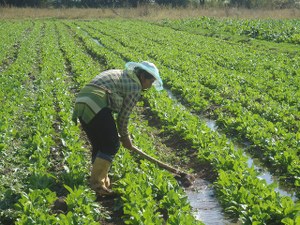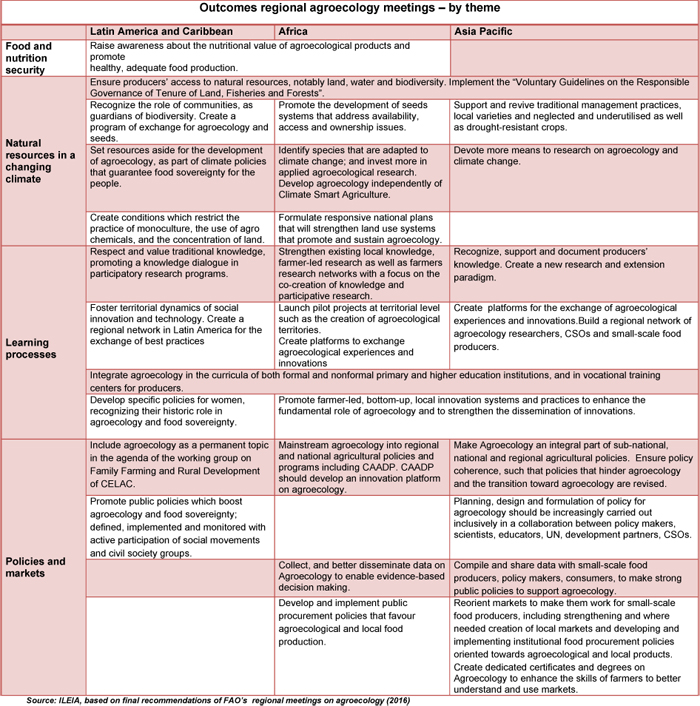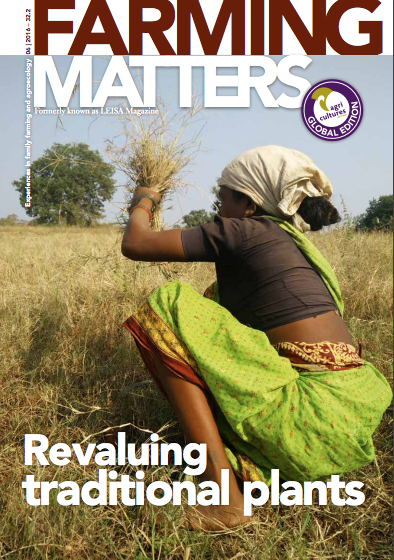In 2015, a series of unique meetings on agroecology were organised on three continents. Hundreds of civil society representatives, academics and policy makers attended. What have the meetings achieved and what is next?

“Agroecology (…) is an approach that will help to address the challenge of ending hunger and malnutrition in all its forms”said José Graziano da Silva in 2014. The Food and Agriculture Organization of the United Nations (FAO), which he leads, had just organised the International Symposium on Agroecology for Food Security and Nutrition. Indeed, agroecology is gaining momentum for its potential to increase food and nutrition security, address climate change, enhance biodiversity and build food sovereignty. FAO decided to continue discussing agroecology via regional meetings in Africa, Asia and the Pacific, and Latin America and the Caribbean throughout 2015. This article reflects on the outcomes around four key themes of these discussions.
Agroecology as a path towards food and nutrition security
Agroecology can be a key strategy to improve food and nutrition security, argued Roberto Ugas (National Agrarian University La Molina, Peru) at the regional meeting for Latin America and the Caribbean: “Andean farmers who keep at least 70 % of their productive area under agroecological management have better food availability, access, use and stability.”
In all meetings, the need to enable biodiverse, agroecological farming was voiced. One fundamental step is securing producers’ access (especially women, youth, family farmers, and indigenous peoples) to land, water, and seeds. A lack of knowledge and awareness about the contribution of agroecology to diverse diets was highlighted as a major barrier. To tackle this, participants suggested integrating agroecology into education for youth and adults, as well as farmer field schools and other farmer-to-farmer methodologies, with special attention for traditional knowledge.
It was made clear that a holistic, transdisciplinary approach based on new relationships between farmers, academia and other knowledge holders will be crucial. In all regions, producers presented agroecology as a way of life and a path towards food sovereignty for rural and urban citizens. In this respect, participants emphasised the importance of recognising the right of peoples, communities, and countries to define their own agricultural, labour, fishing, and food and land policies.
Agroecology and natural resources in a changing climate
Various agroecological practices promote carbon storage through increasing organic matter in the soils, and reintroducing trees to the landscape. The great climate adaptation potential of traditional management practices with local varieties of traditional food crops, and particularly drought resistant species, was also emphasised. Therefore, it was stated that more resources need to be devoted to research on the link between agroecology and climate change, an on farmers’ selection of varieties and species.

Massa Koné (CMAT, Malian Convergence against Land Grabbing) said: “agroecology is the only answer to climate change and farmers hold answers that must be valued. This means we must respect the rights of people to their land in order to ensure peace”. Indeed, agroecology not only helps to cool the planet and to adapt to the impact of climate change, participants emphasised, but also brings social benefits, expressed in stronger social security networks that are essential to resilience. In keeping with their Nyéléni Declaration on Agroecology (2015), civil society representatives rejected attempts to reduce the concept of agroecology to a set of technologies designed to alleviate the harmful impacts of industrial agriculture.
Learning processes in agroecology
There was general consensus that farmers and other food producers should be at the forefront of knowledge co-creation in agroecology. Farmer-led, bottom-up, local innovation systems and practices are especially important, as expressed by Ibrahima Diedhiou of the University of Thiès in Senegal when he said: “Farmer innovations have greatly improved the livelihoods of farming communities. Unfortunately, the innovation capacity of local communities remains insufficiently valued”.
As a result, the way knowledge is built and shared needs to be fundamentally different from conventional technology transfer in order to support agroecology. In the words of Clara Nicholls (SOCLA, Latin American Scientific Society for Agroecology): “Agroecology is not only a scientific approach, it is a way of life that values science, but is also aware that knowledge comes from the ancient traditions of people.”
In all regions, participants discussed how to strengthen and increase the recognition of peasant and indigenous knowledge, farmer-led research and farmer-to-farmer learning. Participants reflected on the role of scientists in interactions with farmers, and discussed how to transform these into processes that are truly driven by farmers.
Public policies to promote agroecology
Discussions in all regional meetings made it clear that fundamental change in policy is needed for agroecology to reach its full potential. The cross-sectoral nature of effective policies was highlighted, as agroecology not only touches on production and consumption, but also on issues such as health, education, and the environment. The first policy priority in agroecology would be to put control of seeds, biodiversity, land and territories, waters and knowledge in the hands of producers. Without access to these resources the transition to agroecology is impossible. Farmer Sophia Ogutu from Kenya emphasised: “The focus of policies needs to be on giving farmers, especially women, control over their natural resources.”

The role of new markets for agroecological products was considered a pertinent issue. Proposals were made for the reorientation of markets towards small scale producers, and for public procurement policies for agroecological products.Experience has shown that the most effective policies have a local character and promote the further development of proven successes such as community seed banks, farmer field schools, agroecology schools, demonstration farms and farmer-to-farmer exchanges. Therefore calls were made to collect and better disseminate data from existing experiences with agroecology to enable evidence-based decision making. Throughout all seminars, civil society recommended that policies on agroecology must be developed within a food sovereignty framework. Finally, the importance of participatory policy development processes was highlighted, that respect the needs of both farmers and governments.
Reflection
In many ways, the regional meetings boosted the official recognition of agroecology as a relevant and time tested approach, and strong recommendations were made in all regions (see box below). While this is welcome progress, the meetings could have addressed the inherent contradictions between agroecology and the current neoliberal approach to modernising agriculture in a more systematic way. More specifically, they could have explored how to achieve a shift away from a productivist mindset, with its focus on aggregate supply and increases in yields, towards a more multi-functional agricultural model that pursues improved nutrition, resilience, food sovereignty and the sustainable use of resources.
Several important issues were not on the table during the meetings. For example, how to overcome the strong influence of agribusinesses on policy making processes. In the future, this issue should be dealt with in more detail and with more time. It is also notable that confusion exists around FAO’s support for agroecology on the one hand and their engagement with the Global Alliance for Climate Smart Agriculture on the other.
Inadequate discussions about the above issues seemed to imply that ‘business as usual’ can continue, instead of making it clear that a fundamental shift towards agroecology is needed. As social movements stated in the Nyéléni Declaration of the International Forum on Agroecology (2015), “the real solutions to the crises of the climate, malnutrition, etc., will not come from conforming to the industrial model. We must transform it and build our own local food systems that create new rural-urban links, based on truly agroecological food production by peasants, artisanal fishers, pastoralists, indigenous peoples, urban farmers, etc.”
In the second half of 2016, FAO will organise two more regional meetings on agroecology, one in China and one in Hungary. FAO can potentially play an important role in connecting various actors around agroecology and in catalysing a shift towards an enabling policy environment for agroecology worldwide.
While we appreciate the start of the conversation on how to strengthen agroecology in the regions, and the majority of the recommendations are worthy of implementation, bolder steps are now needed. We must emphasise the need to transform dominant approaches to food and agriculture, and put farmer-led agroecology firmly at the centre of policy, practice and research. Then, agroecology can play a major role in creating fair and sustainable future food systems, food sovereignty and healthy societies.
Janneke Bruil (j.bruil@ileia.org) is Coordinator Learning and Advocacy at ILEIA
Diana Quiroz (d.quiroz@ileia.org) is Research, Editing and Advocacy Officer at ILEIA.
A detailed report by FAO and ILEIA that synthesises the outcomes of the regional meetings will be published in the course of 2016 and made available at www.ileia.org.



